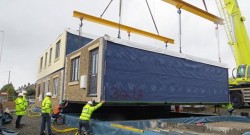It's a Crisis - a Housing Crisis
There's nothing new about Modular Construction, it's been around for absolutely decades. Some countries have certainly mastered this more than others with different methods of production including CLT and Steel Frame. The benefits are many and obvious from speed of construction, which gives you much faster return on your investment, with low waste, flexibility, environmentally friendly, highest quality etc - it ain't rocket science.
Lithuania GB launched our first Off-Site Construction event at the Embassy of Lithuania back, London in September, introducing some of our Lithuanian Partners to our construction clients. Since then the enquiries have been flooding in from all around the country. Construction comes second nature to Lithuanians, indeed a large proportion of our UK 'excellent workforce' comes from the Baltic Region. The UK Government's announcement in November this year via Chancellor Philip Hammond set a target for building 300,000 homes to be built every year. The Government is enthusiastically taking on-board modern methods of construction, such as 'Off-Site Manufacturing' to combat construction skills shortages. Mayor Sadiq Kahn has set an annual target of 66,000 London homes alone.
“Between 1997 and 2016, London’s population increased by a quarter – an extra 1.7 million people – but only 370,000 homes were built. One result has been the rise in the number of families sharing with other families, which now affects 470,000 households. The figures are contained in a stark assessment of housing need that will form the basis of the London Plan, a five-year planning strategy due to be published next month. Khan said: “Successive prime ministers have failed to invest anywhere near enough” The Guardian, 27th October 2017
With 'Off-Site Construction' factories popping up all over the place however, there are major issues including;-
- Capacity - differing opinions on the state of play with UK specialist manufacturing for sure. Some factories are either too small or full-up to capacity. There are future plans for some new UK factories with ambitions to take over the world of Modular Construction. I've kept my ear close to the ground, including numerous discussions with leading industry experts, as well as the world's largest Real Estate firms. Some do confirm that the UK is coming out of being a Cottage Industry, some say that they are understandably supportive of home grown industries, but the reality is that there are specialists and proven companies in the Baltic's, often with 30+ year proven track records, that have existing larger capacity, huge flexible expansion plans and closer to timber resources.
- Relationships - there are plenty of small to medium size developers wishing to embrace Modular Construction, but without securing a site - or to even being near to - they may face problems being taken seriously by factories. They certainly face big problems. The 'big boys' can in some instances take first priority which is only natural. When importing Modular Construction into the UK, it is vital to work with experts embracing a collaborative culture - a highly experienced workforce, along with a highest quality customer service ethos. This is where we can expertly help you to achieve the very best results with a turn-key offering.
- Construction Skills Crisis - many skilled EU construction workers are going home to their own countries. Although the UK Government is doing its best to encourage skills training, it is obviously going to take a long time to develop a 'home grown' solution. Thereby creating a massive opportunity for our Baltic Partners and already we have expanded into neighbouring countries including Estonia and Latvia. We work closely with our Lithuanian Cluster of companies to provide 24/7 support, spreading the necessary workload. Our mission is to support our British and Baltic partners, to be best in their field, to work together collaboratively, focused on delivering beneficial results for our partners.
Original link - Linkedin









